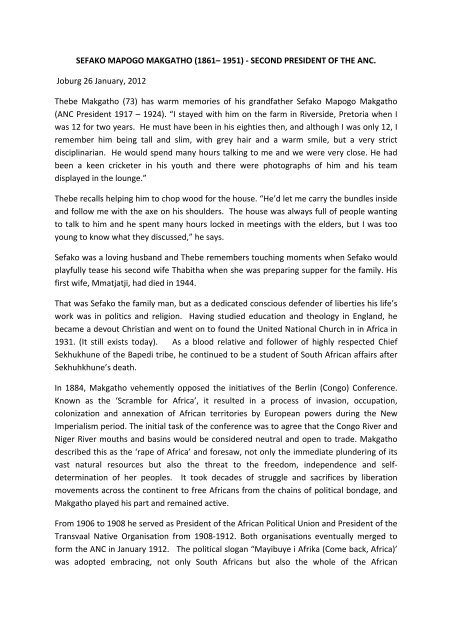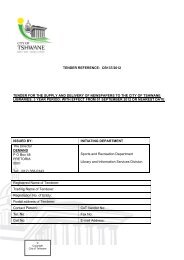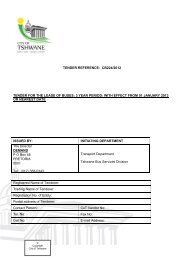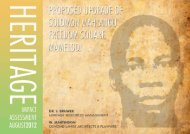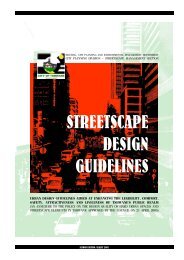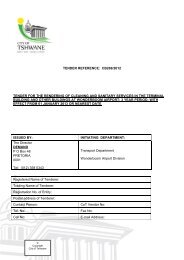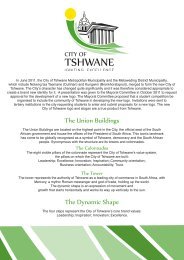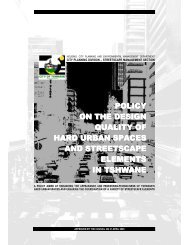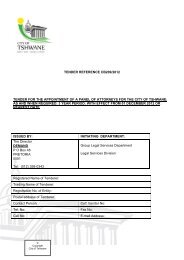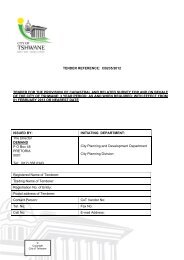You also want an ePaper? Increase the reach of your titles
YUMPU automatically turns print PDFs into web optimized ePapers that Google loves.
SEFAKO MAPOGO MAKGATHO (1861– 1951) ‐ SECOND PRESIDENT OF THE ANC.<br />
Joburg 26 January, 2012<br />
Thebe <strong>Makgatho</strong> (73) has warm memories of his grandfather <strong>Sefako</strong> Mapogo <strong>Makgatho</strong><br />
(ANC President 1917 – 1924). “I stayed with him on the farm in Riverside, Pretoria when I<br />
was 12 for two years. He must have been in his eighties then, and although I was only 12, I<br />
remember him being tall and slim, with grey hair and a warm smile, but a very strict<br />
disciplinarian. He would spend many hours talking to me and we were very close. He had<br />
been a keen cricketer in his youth and there were photographs of him and his team<br />
displayed in the lounge.”<br />
Thebe recalls helping him to chop wood for the house. “He’d let me carry the bundles inside<br />
and follow me with the axe on his shoulders. The house was always full of people wanting<br />
to talk to him and he spent many hours locked in meetings with the elders, but I was too<br />
young to know what they discussed,” he says.<br />
<strong>Sefako</strong> was a loving husband and Thebe remembers touching moments when <strong>Sefako</strong> would<br />
playfully tease his second wife Thabitha when she was preparing supper for the family. His<br />
first wife, Mmatjatji, had died in 1944.<br />
That was <strong>Sefako</strong> the family man, but as a dedicated conscious defender of liberties his life’s<br />
work was in politics and religion. Having studied education and theology in England, he<br />
became a devout Christian and went on to found the United National Church in in Africa in<br />
1931. (It still exists today). As a blood relative and follower of highly respected Chief<br />
Sekhukhune of the Bapedi tribe, he continued to be a student of South African affairs after<br />
Sekhuhkhune’s death.<br />
In 1884, <strong>Makgatho</strong> vehemently opposed the initiatives of the Berlin (Congo) Conference.<br />
Known as the ‘Scramble for Africa’, it resulted in a process of invasion, occupation,<br />
colonization and annexation of African territories by European powers during the New<br />
Imperialism period. The initial task of the conference was to agree that the Congo River and<br />
Niger River mouths and basins would be considered neutral and open to trade. <strong>Makgatho</strong><br />
described this as the ‘rape of Africa’ and foresaw, not only the immediate plundering of its<br />
vast natural resources but also the threat to the freedom, independence and selfdetermination<br />
of her peoples. It took decades of struggle and sacrifices by liberation<br />
movements across the continent to free Africans from the chains of political bondage, and<br />
<strong>Makgatho</strong> played his part and remained active.<br />
From 1906 to 1908 he served as President of the African Political Union and President of the<br />
Transvaal Native Organisation from 1908‐1912. Both organisations eventually merged to<br />
form the ANC in January 1912. The political slogan “Mayibuye i Afrika (Come back, Africa)’<br />
was adopted embracing, not only South Africans but also the whole of the African
continent. The national anthem ‘Nkosi Sikalel i Afrika’ was introduced and black, gold and<br />
green became the official colours of the ANC flag.<br />
<strong>Sefako</strong> <strong>Makgatho</strong> became President of the ANC (1917 – 1924) during a time of change in the<br />
country when the foundations of apartheid legislation were laid. In 1920, the ANC<br />
supported a militant strike by black mineworkers. White workers felt threatened by black<br />
labour on the mines, and revolted in 1922 ‐ a rebellion that was put down violently by Prime<br />
Minister Jan Smuts. During this period the ANC opposed a law to regulate the presence of<br />
Africans in urban areas. It was also the time of the formation of the first major trade union<br />
representing black workers, the Industrial and Commercial Workers' Union (ICU) led by<br />
Clements Kadalie. More restrictions on black South Africans were brought in under the Pact<br />
government from 1924 under JBM Hertzog.<br />
These were only some of the initiatives where <strong>Makgatho</strong> made his mark. In 1906 he helped<br />
establish the Transvaal African Teachers’ Association and in 1923 he launched ‘The Good<br />
Shepherd,’ a journal that spread the message of equal education opportunities. From 1906<br />
to 1908 he served as president of the African Political Union. From 1887 to 1930 he was an<br />
influential Methodist lay preacher. He also participated in delegations and petitions to<br />
London (after World War 1, 1914–1918).<br />
During these momentous years <strong>Makgatho</strong> continued to lead as an educationalist and<br />
theologian. He led anti‐pass campaigns, calling the pass ‘infernal’ and a ‘badge of slavery’.<br />
He vigorously opposed the extension of the ‘dompas’ to African woman and successfully<br />
took the government to court over the Transvaal Poll Tax. He spearheaded a successful<br />
campaign in Pretoria for the right to walk on the city pavements instead of competing with<br />
vehicles and horses for space in the middle of the road. Under his leadership Africans won<br />
the right to use segregated first‐class and second‐class facilities on South African trains<br />
instead of being confined to goods trains.<br />
With <strong>Makgatho</strong>’s active participation in 1912 and in response to the race laws contained in<br />
the South Africa Act (1909) the ANC aimed to unite Africans not just in South Africa, but<br />
also in the neighbouring territories. During his tenure he committed to fighting imperialism,<br />
to spearhead the common struggle for freedom and determination, to destroy racism and<br />
to build on its ruins, a non‐racial South Africa with traditional democratic rights that would<br />
be available to all, irrespective of race, colour, religion or gender.<br />
The <strong>Sefako</strong> Mapogo <strong>Makgatho</strong> Memorial Foundation was recently launched to preserve,<br />
promote and transmit the legacy and heritage of the late <strong>Sefako</strong> Mapogo <strong>Makgatho</strong>. The<br />
foundation is headed up by businessman and great grandson of <strong>Sefako</strong>, Tommy <strong>Makgatho</strong><br />
(chairman) and Khentu Pitje (CEO).<br />
The month of February has been devoted to paying tribute to <strong>Sefako</strong>’s life and memory and<br />
is part of the ANC’s centenary celebrations.


